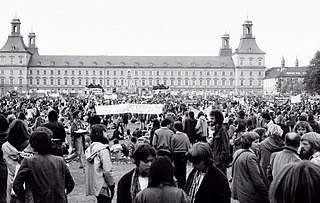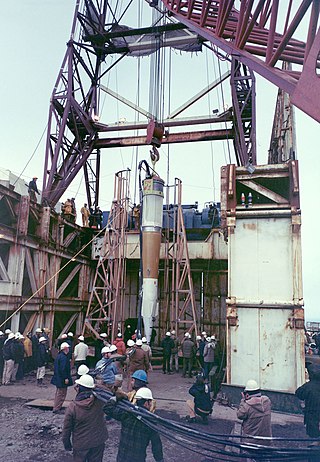
Greenpeace is an independent global campaigning network, founded in Canada in 1971 by Irving Stowe and Dorothy Stowe, immigrant environmental activists from the United States. Greenpeace states its goal is to "ensure the ability of the Earth to nurture life in all its diversity" and focuses its campaigning on worldwide issues such as climate change, deforestation, overfishing, commercial whaling, genetic engineering, and anti-nuclear issues. It uses direct action, lobbying, research, and ecotage to achieve its goals.

A laboratory is a facility that provides controlled conditions in which scientific or technological research, experiments, and measurement may be performed. Laboratory services are provided in a variety of settings: physicians' offices, clinics, hospitals, and regional and national referral centers.
Eco-terrorism is an act of violence which is committed in support of environmental causes, against people or property.

Patrick Albert Moore is a Canadian industry consultant, former activist, and past president of Greenpeace Canada. Since leaving Greenpeace in 1986, Moore has criticized the environmental movement for what he sees as scare tactics and disinformation, saying that the environmental movement "abandoned science and logic in favor of emotion and sensationalism". Greenpeace has criticized Moore, calling him "a paid spokesman for the nuclear industry, the logging industry, and genetic engineering industry" who "exploits long-gone ties with Greenpeace to sell himself as a speaker and pro-corporate spokesperson".

A refrigerant is a working fluid used in the refrigeration cycle of air conditioning systems and heat pumps where in most cases they undergo a repeated phase transition from a liquid to a gas and back again. Refrigerants are heavily regulated due to their toxicity, flammability and the contribution of CFC and HCFC refrigerants to ozone depletion and that of HFC refrigerants to climate change.

The anti-nuclear movement is a social movement that opposes various nuclear technologies. Some direct action groups, environmental movements, and professional organisations have identified themselves with the movement at the local, national, or international level. Major anti-nuclear groups include Campaign for Nuclear Disarmament, Friends of the Earth, Greenpeace, International Physicians for the Prevention of Nuclear War, Peace Action, Seneca Women's Encampment for a Future of Peace and Justice and the Nuclear Information and Resource Service. The initial objective of the movement was nuclear disarmament, though since the late 1960s opposition has included the use of nuclear power. Many anti-nuclear groups oppose both nuclear power and nuclear weapons. The formation of green parties in the 1970s and 1980s was often a direct result of anti-nuclear politics.
The Don't Make a Wave Committee was the name of the anti-nuclear organization which later evolved into Greenpeace, a global environmental organization. The Don't Make a Wave Committee was founded in Vancouver, British Columbia, Canada to protest and attempt to halt further underground nuclear testing by the United States in the National Wildlife refuge at Amchitka in the Aleutian Islands of Alaska. The Don't Make a Wave Committee was first formed in October 1969 and officially established in early 1970.

Monika Griefahn is a German politician and one of the co-founders of Greenpeace. She is a member of the Social Democratic Party (SPD).
Greenpeace Nordic is a regional branch of the non-governmental international environmental organization Greenpeace. Greenpeace Nordic is registered in Stockholm with offices also in Helsinki, Copenhagen and Oslo.
London Greenpeace was an anarchist environmentalist activist collective that existed between 1972 and 2001. They were based in London, and came to international prominence when two of their activists refused to capitulate to McDonald's in the landmark libel case known as "McLibel". It was not affiliated with Greenpeace International nor with Greenpeace UK.

Rainbow Warrior was a three-masted schooner most notable for service with the environmental protection organization Greenpeace. She was built to replace the original Rainbow Warrior that the French intelligence service (DGSE) bombed in 1985 in the Port of Auckland, New Zealand, which sank the ship and killed photographer Fernando Pereira.

Philip David Radford is an American activist who served as the executive director of Greenpeace USA. He is the founder and President of Progressive Power Lab, an organization that incubates companies and non-profits that build capacity for progressive organizations, including a donor advisory organization Champion.us, the Progressive Multiplier Fund and Membership Drive. Radford is a co-founder of the Democracy Initiative, was founder and executive director of Power Shift, and is a board member of the Mertz Gilmore Foundation. He has a background in grassroots organizing, corporate social responsibility, climate change, and clean energy.

Cannikin was an underground nuclear weapons test performed on November 6, 1971, on Amchitka island, Alaska, by the United States Atomic Energy Commission. The experiment, part of the Operation Grommet nuclear test series, tested the unique W71 warhead design for the LIM-49 Spartan anti-ballistic missile. With an explosive yield of almost 5 megatons of TNT (21 PJ), the test was the largest underground explosion ever detonated by the United States.
Greenpeace USA is the United States affiliate of Greenpeace International, an environmental nonprofit organization that spawned a social movement inspired by direct actions on the high seas to stop whaling and nuclear testing. Headquartered in Washington D.C., Greenpeace U.S.A. operates with an annual budget of approximately $40 million, employing over 500 people in 2020. The organization relies on donations from members, refuses corporate contributions and refrains from endorsing political candidates, though in 2020 Greenpeace USA issued climate scorecards for presidential candidates and ranked them from best to worst on climate

Jon Hinck is an American environmentalist, lawyer and politician. From 2006 to 2012 he served as a member of the Maine House of Representatives, representing House District 118, part of Portland, Maine. From 2013 through 2016, Hinck held an at-large seat on the Portland, Maine City Council.

Dennis Delaney is an American writer and actor, and former environmental activist. A founding member of Greenpeace USA, he became its first National Director in 1980. He is a graduate of the University of North Carolina School of the Arts, and the University of California, Santa Cruz. He is the author of the novel Saving Whales.

Green Planet Energy is a German electric utility in the form of a registered association. The stated goal of the cooperative is the provision of environmentally friendly energy to the electrical grid.
The Phyllis Cormack is a 25-meter (82-foot) herring and halibut seine fishing boat, displacing 99 tons and crewed by up to 12 people. The wooden vessel was built in 1941 in Tacoma, Washington, by Marine View Boat Works.
Unearthed is an environmental investigative journalism publication that is operated by the nonprofit organization Greenpeace UK.











